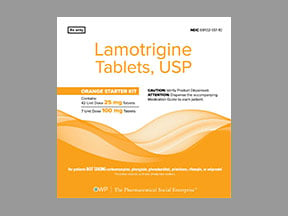
Lamotrigine Starter Kit-orange Coupons & Savings Card – Discount Prices from $258.46
Lamotrigine is used alone or with other medications to prevent and control seizures. It may also be used to help prevent the extreme mood swings of bipolar disorder in adults. Lamotrigine is known as an anticonvulsant or antiepileptic drug. It is thought to work by restoring the balance of certain natural substances in the brain. This drug is not approved for use in children younger than 2 years due to an increased risk of side effects (such as infections).
Our coupons are free to use. Before paying, show the pharmacist your Lamotrigine Starter Kit-orange savings card to get your free discount. Use our filters below to edit the prescription box to match your needs. The Lamotrigine Starter Kit-orange prices will update based on your prescription needs. Above our Lamotrigine Starter Kit-orange coupons, you can change your location to see pharmacy prices and costs in other areas. We're here to help you buy Lamotrigine Starter Kit-orange at the lowest price with our prescription discount card.
My prescription
Edit
42 x 25 MG &7 x 100 MG, Lamotrigine Starter Kit-orange (49 Kits)
Select pharmacy

CVS
$677.27
COUPON PRICE
Walgreens
$258.46
COUPON PRICE
Albertsons
$266.75
COUPON PRICE
Walmart
$768.11
COUPON PRICELamotrigine Starter Kit-orange savings card
Show this card to your pharmacist
Walgreens
$258.46
BIN
ID
PCN
GRP
015995
LHKPY666823
GDC
DR33
Powered by
Lamotrigine is used alone or with other medications to prevent and control seizures. It may also be used to help prevent the extreme mood swings of bipolar disorder in adults. Lamotrigine is known as an anticonvulsant or antiepileptic drug. It is thought to work by restoring the balance of certain natural substances in the brain. This drug is not approved for use in children younger than 2 years due to an increased risk of side effects (such as infections).
Our coupons are free to use. Before paying, show the pharmacist your Lamotrigine Starter Kit-orange savings card to get your free discount. Use our filters below to edit the prescription box to match your needs. The Lamotrigine Starter Kit-orange prices will update based on your prescription needs. Above our Lamotrigine Starter Kit-orange coupons, you can change your location to see pharmacy prices and costs in other areas. We're here to help you buy Lamotrigine Starter Kit-orange at the lowest price with our prescription discount card.
